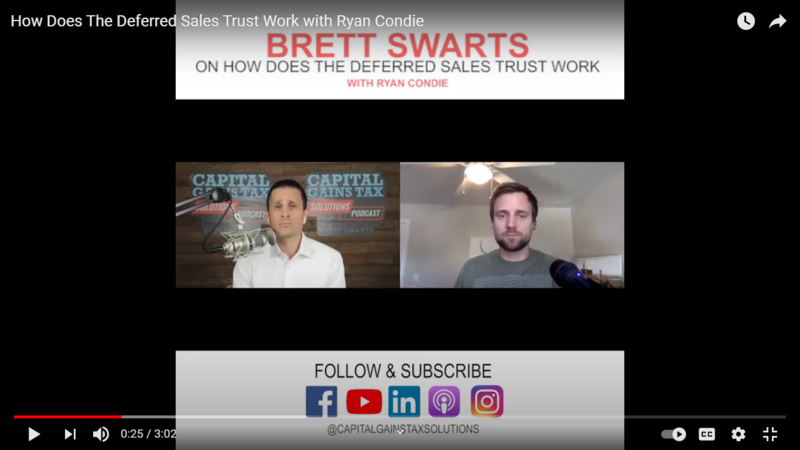Updated about 4 years ago on .
How Does The Deferred Sales Trust Work

Ryan Condie:
So this is a perfect example. Let's keep going with this example here, Brett. So someone exits their business, they have a $2.5 million windfall. Most people think, oh, cool, that's a ton of money. And you know, but by the time all the taxman comes and kind of eats away at all these different fees, you got broker fees and lawyer fees, if you're not walking away from two and a half million bucks, especially with your tax burden, he said, the $600,000. So he's able to put, you know, say the 2.6 million minus some of the fees with brokerage and the transaction and stuff into like a separate account. And then what does that look like he has certain restrictions, can he invest in stocks, real estate, other businesses? How does that work in terms of the next steps for him?
Brett Swarts:
That's a great question. So the IRS gives these tax incentives they call legal tax loopholes to incentivize the money to keep working right. And so what they don't want to do is, you know, for example, you and I sell a business and just take our money to sit in the bank, right? Or just take it and just spend it on boats and cars, in our houses, because that doesn't necessarily incentivize the economy. And that's kind of cool for us, right? So what they say is, hey, we'll allow these legal loopholes as long as you put it into investments, investment purpose, such as stock market, right stocks, bonds, mutual funds, such as a real estate investment, real estate, such as a new business venture, why? Because that spurs economic growth, which in turn creates more jobs, which in turn actually creates more tax revenue. So it's a completely legal way to do this after 1000s of closes. Now 1920s tax law, originally known as a seller carry-back, we just perfected it for this niche for the deferred sales trust. So it's really flexible. And what's nice about it is you can either receive income or not receive income, you can invest it again in real estate or not in real estate. And you can use it as a kind of funding source for your next business venture. So it just all depends on what your wealth plan is and what your vision is. And oftentimes, it depends on what stage of life you're in. So some of our clients, their baby boomers, and they're part of the largest wealth transfer in the history of the planet. And this is according to the American Bankers Association, that's about 17 to $20 trillion, that's going to pass and the next 20 years. In fact, there are about 10,000 baby boomers turning 65 every day, about 70. That's a lot. And there they're really struggling with toilets, trash liability employees, these businesses, they poured blood, sweat, and tears on for the last 20, 30, 40 years. But they didn't know how to get out without getting again hammered by that 30 to 50% capital gains tax. So we got to just kind of clarify your vision, look what you're trying to do, and then just do a mathematical equation. At the end of the day, as long as your deals at least a million or more net equity, and at least probably four to $500,000 again. Then you're looking at the deferred sales trust as I think is a real, real, solid viable option.
Learn more about Deferred Sales Trust
Visit: www.capitalgainstaxsolutions.com




